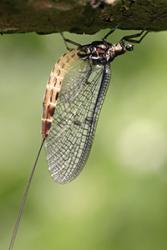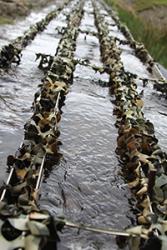DNA pinpoints river animals in the here-and-now
New research proves that environmental DNA survives for less than two days in small fast-flowing rivers and so provides highly localised and current information on species composition. This is crucial new evidence as biologists turn increasingly to new DNA sampling techniques to assess aquatic ecosystem health.
 A Mayfly nymph - one of the species looked for in the researchEnvironmental DNA sampling is being adopted more and more by government agencies and commercial contractors in biodiversity assessments because it uses far less manpower, needs less expertise and could reduce costs. The technique involves taking water samples from aquatic habitats and screening for remnants of DNA (e.g. cells and secretions) originating from the species present. The hope is that this rapid approach could be automated to replace more laborious methods of sample sorting and identification that are currently needed.
A Mayfly nymph - one of the species looked for in the researchEnvironmental DNA sampling is being adopted more and more by government agencies and commercial contractors in biodiversity assessments because it uses far less manpower, needs less expertise and could reduce costs. The technique involves taking water samples from aquatic habitats and screening for remnants of DNA (e.g. cells and secretions) originating from the species present. The hope is that this rapid approach could be automated to replace more laborious methods of sample sorting and identification that are currently needed.
But a big question has remained: how long has the eDNA been in the water? And from how far up-river might it have come? An international team, led by biologists from ΒιΆΉΝψβs School of Biological Sciences in the LOFRESH project, now have the answer. Reporting in the first issue of a new academic journal from Nature, Communications Biology (), co-ordinator Prof. Simon Creer explains:
βThis eDNA technique has been used far more widely over recent years, and has already contributed to conserving species in the UK such as the Great Crested Newt. While the technique can identify creatures ranging from the microscopic to larger fish and mammals, we could not say with certainty how long ago any creature had been present. Was this βzombieβ eDNA persisting from a long-dead creature or was it more recent?β
The experiments involved introducing eDNA from different species into globally unique experimental streams near Llyn Brianne in Central Wales and showed that this introduced material persisted for just two days. This time frame was even shorter in more acidic upland waters. DNA from very different species (water-fleas, mayfly nymphs and the European eel) lasted for similar periods adding further confidence to the accuracy and reliability of the results for different types of animals.
Dr Mat Seymour, Post Doctoral researcher and lead author on the project explains:
βThe relatively short time-frame for detecting DNA particles in natural environments makes the application of eDNA based methods, for biomonitoring and environmental assessment, highly relevant since we can now be confident that we are getting a near real-time sample of the community.β
 The experimental facilities at Llyn BrianneCardiff Universityβs Director of Water Research, Dr Isabelle Durance, added:
The experimental facilities at Llyn BrianneCardiff Universityβs Director of Water Research, Dr Isabelle Durance, added:
βThis is hugely exciting work, bringing together world-class molecular approaches to biology with unique experimental facilities here in Wales at Llyn Brianne. Itβs a major step in the development and validation of eDNA as an environmental management tool, but there is more to do. A key challenge now is to assess how well eDNA reveals whole communities of species present in streams and rivers in varying numbersβ
Prof Jack Cosby from the Centre for Ecology and Hydrology ΒιΆΉΝψ, looks to the future:
βThis work takes us one step further to understanding how we can use these eDNA techniques to improve our national scale monitoring of river quality and biodiversityβ.
The research team is now testing these methods in natural river systems, sampling Walesβ river Conwy intensively and up to 60 additional locations, including locations in Europe and the USA.
This work was funded by the UKβs Natural Environment Research Council as a Highlight Topic grant. Research partners included ΒιΆΉΝψ, Cardiff University, the NERC Centre for Ecology & Hydrology, ΒιΆΉΝψ & Wallingford, University of Birmingham, The University of Sydney, Cornell University and the University of California Riverside.
Publication date: 2 February 2018
